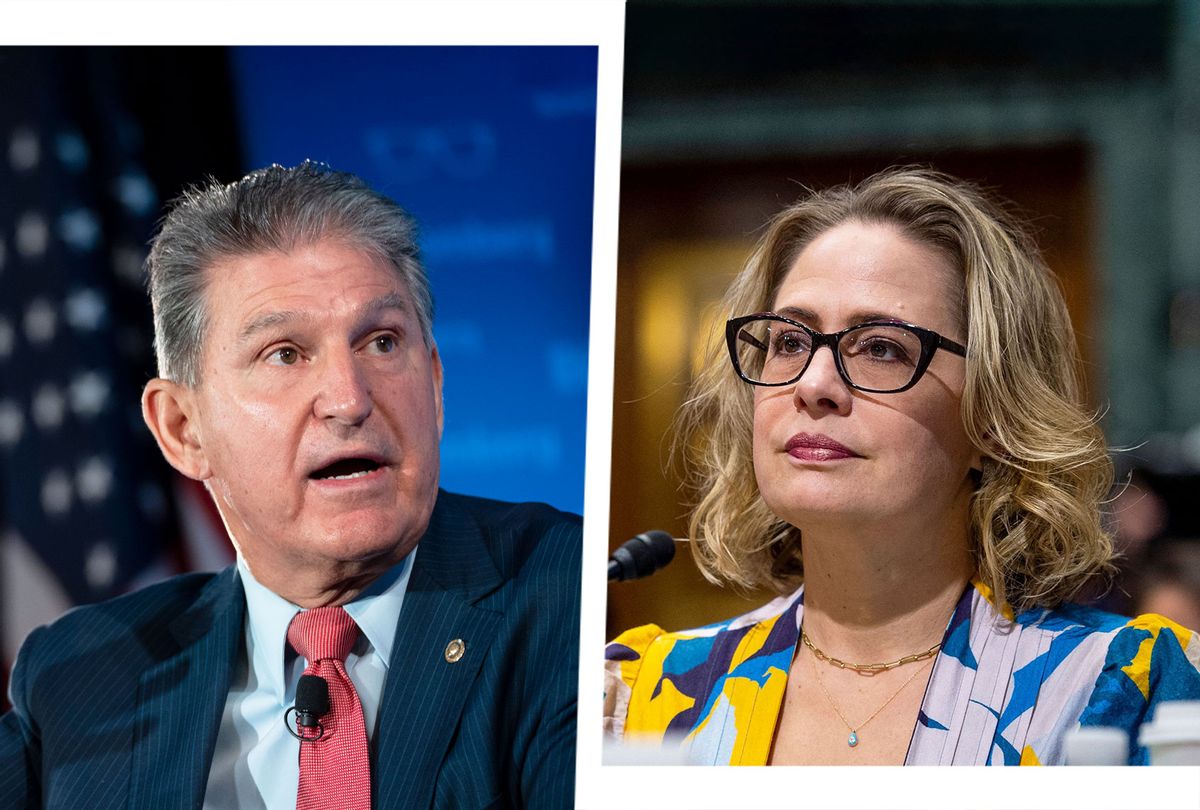Sen. Kyrsten Sinema, D-Ariz., wants Democrats to drop a measure addressing a tax loophole used by hedge fund managers and private equity executives from Sen. Joe Manchin's, D-W.Va., climate and health care deal.
Sinema is the only Senate Democrat who has not committed to voting for the Inflation Reduction Act, a $740 billion deal cut by Manchin and Senate Majority Leader Chuck Schumer, D-N.Y., to provide $369 billion in climate and energy funding, lower prescription drug costs and crack down on tax avoidance. After days of silence, Axios reported on Wednesday that Sinema has "concerns" about a tax measure that makes up less than 2% of the bill's revenue.
Sinema wants to "nix language" narrowing the so-called carried interest loophole, according to Politico. The loophole allows hedge fund managers and private equity execs to have their income taxed at the 15% capital gains tax instead of the standard, much higher income tax rate.
Closing the loophole would require wealthy investors to instead pay a 37% income tax rate but Manchin's proposal doesn't even do that. The current legislation would require managers to hold on to investments for five years instead of the current three years to qualify for the tax break, and imposes stricter requirements on those investments, according to HuffPost.
While a proposal to close the loophole from Senate Finance Chairman Ron Wyden, D-Ore., and Sen. Sheldon Whitehouse, D-R.I., would have raised about $70 billion in new revenue, Manchin's deal with Schumer is projected to raise just $14 billion over the next 10 years.
Manchin previously told reporters that "the only thing I was adamant about" in negotiations was including the provision in the bill, arguing that "you can't justify" keeping the loophole.
"On the carried interest — for the wealthiest one-tenth of 1% of Americans to take advantage of a tax break for them, that they have no risk at all and they get to take the lowest tax rate?" he said in a radio interview on Tuesday. "So we get rid of that."
Manchin appeared frustrated by Sinema's opposition to the measure.
"I just want someone to explain. I can't understand it," he told Fox News. "I'm sure [Sinema] has a reason, and I want to hear more about it."
Want a daily wrap-up of all the news and commentary Salon has to offer? Subscribe to our morning newsletter, Crash Course.
Sinema has raised more than $2.2 million from the securities and investment sector since 2017, according to OpenSecrets. Last year alone, she netted more than $144,000 in donations from industry groups that lobbied against closing the carried interest loophole, according to HuffPost.
"Wall Street has donated over $2 million to Sinema since she took office in 2017," tweeted former Labor Secretary Robert Reich. "Looks like they are getting a huge return on their investment."
Sinema previously successfully fought to preserve virtually all of the Trump tax cuts during negotiations over President Joe Biden's Build Back Better proposal despite claiming to oppose Trump's lone legislative accomplishment. She has also fought Democratic efforts to crack down on abuse of a conservation easement tax deduction and this week introduced legislation to provide a tax break to cryptocurrency investors.
Sinema on Tuesday held a virtual call with Arizona business interests to discuss their "concerns" about the reconciliation bill, according to Danny Seiden, who heads the Arizona Chamber of Commerce. He praised Sinema for her "willingness to listen to AZ job creators." The Chamber of Commerce has long opposed efforts to address the tax loophole.
Sinema during the call also discussed the bill's proposed 15% corporate minimum tax aimed at reining in tax avoidance by corporations that make over $1 billion per year. Sinema last year called the proposal a "common sense" step to ensure that "highly profitable corporations" pay their share.
"Is this written in a way that's bad?" Sinema asked the group, Seiden told CNN. "It gave me hope that she's willing to open this up and maybe make it better," he said.
"She is somebody who errs on the side of caution when it comes to changing tax policies. ... obviously, I think [their input] shaped where she is on the economic parts of this bill," former Sinema spokesman John LaBombard told Axios.
Republicans, who have donated heavily to Sinema amid her effort to stonewall Biden's agenda, and right-wing groups like the Koch-aligned Americans for Prosperity, have also lobbied heavily to convince Sinema to block the reconciliation bill. Sinema previously came under fire for meeting with donor groups that opposed Biden's BBB proposal while stonewalling negotiations.
"We can only assume that she's been motivated by the money they're donating to her campaigns," a former Sinema staffer told HuffPost. "I knew she was always trying to be an atypical Democrat. She wants to be Arizona's new maverick. I never thought she would just toe the party line. But throwing away campaign promises you made and snubbing your nose at the people who got you elected, that makes you the opposite of a maverick. It makes you a corporate shill."
Sinema is also seeking to add about $5 billion in drought resiliency funding to the climate deal, according to Politico.
"One for the donors," tweeted Bloomberg reporter Ryan Teague Beckwith, "one for the constituents."

Shares